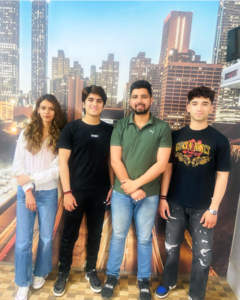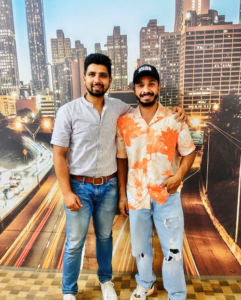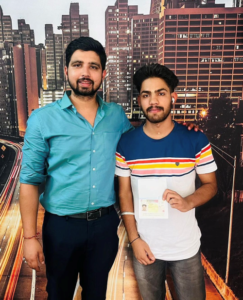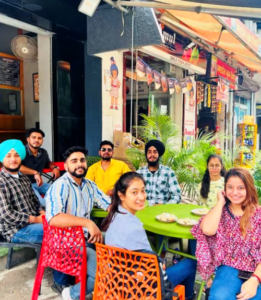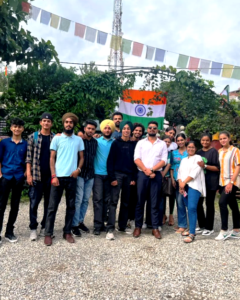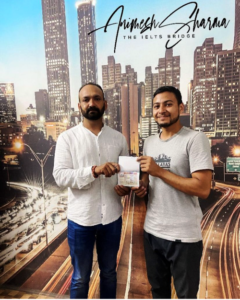Section 1: CAUSTON HEALTH CENTRE: PATIENT INFORMATION LEAFLET
Questions 1-4: Identifying information
[This question asks you to find information from the passage and write the number of the paragraph (A, B, C or D … .. ) in the answer sheet. Now, if the question is given in the very first part of the question set, I’d request you not to answer them. It’s mainly because this question will not follow any sequence, and so it will surely kill your time. Rather, you should answer all the other questions first. And just like List of Headings, only read the first two lines or last two lines of the expected paragraph initially. If you find the answers, you need not read the middle part. If you don’t find answers yet, you can skim the middle part of the paragraph. Keywords will be a useful matter here.]
Question 1: what to do if you need help outside normal working hours
Keywords for this question: need help, outside, normal, working hours,
In the ‘Weekends and Nights’ section, the writer says in line no. 2, “Please remember this is in addition to our normal working day. Urgent calls only please.”
Here, in addition to = outside, normal working day = normal working hours,
So, the answer is: B
Question 2: who to speak to first for general information,
Keywords for this question: speak to first, general information,
In the ‘Receptionists’ section, the writer says, “Our receptionists provide your primary point of contact-they are all very experienced and have a lot of basic information at their fingertips. They will be able to answer many of your initial queries and also act as a link with the rest of the team. .. .. .”
Here, primary point of contact = speak to first, initial queries = general information,
So, the answer is: F
Question 3: what happens when you register with the Centre
Keywords for this question: what happens, register with, the Centre,
In the ‘New Patients’ section, the author mentions, “Within 3 months of registering with the Centre, new patients on regular medication are invited to attend a health check with their doctor.”
Here, Within 3 months of registering with the Centre = when you register with the Centre,
So, the answer is: D
Question 4: what to do if you need to cancel a doctor’s appointment
Keywords for this question: need to cancel, doctor’s appointment,
In the ‘Appointments’ section, in lines 3-4, the author says, “ . . . if you cannot keep an appointment, please phone in and let us know as soon as possible so that it can be used for someone else. .. .. ”
Here, cannot keep an appointment = need to cancel a doctor’s appointment,
So, the answer is: A
Questions 5-9: TRUE, FALSE, NOT GIVEN
[In this type of question, candidates are asked to find out whether:
The statement in the question agrees with the information in the passage – TRUE
The statement in the question contradicts with the information in the passage – FALSE
If there is no information on this – NOT GIVEN
For this type of question, you can divide each statement into three independent pieces and make your way through with the answer.]
Question 5: You must always see the same doctor if you visit the centre.
Keywords for this question: must always see, same doctor, if, visit, the centre,
In the ‘Appointments’ section, the writer says in the beginning, “. . .. . We suggest that you try to see the same doctor whenever possible because it if helpful for both you and your doctor to know each other well. .. .. .”
Here, We suggest that you try to see the same doctor = it is a suggestion (it is not a must-do thing),
So, the answer is: FALSE
Question 6: If you want a repeat prescription, you must make an appointment.
Keywords for this question: repeat prescription, must make an appointment,
In the ‘Appointments’ section, the writer also says, “ . .. .. . We try hard to keep our appointments running to time, and ask you to be punctual to help us achieve this; if you cannot keep an appointment, please phone in and let us know as soon as possible so that it can be used for someone else. . .. …”
However, the writer doesn’t mention anything here about a repeat prescription.
So, the answer is: NOT GIVEN
Question 7: Helen Stranger is the Head Nurse..
Keywords for this question: Helen Stranger, Head Nurse,
In the ‘Centre Nurses’ section, the author mentions, “Liz Stuart, Martina Scott and Helen Stranger are available daily by appointment to help you with dressings, ear syringing, children’s immunisations, removal of stitches and blood tests. They will also advise on foreign travel, and can administer various injections and blood pressure checks. For any over 75s unable to attend the clinic, Helen Stranger will make a home visit. All three Centre Nurses are available during normal working hours to carry out health checks on patients who have been on doctors’ lists for 3 years.”
Here, we see the name of Helen Stranger as the centre nurse. However, we find no information on whether she is the Head Nurse or not.
So, the answer is: NOT GIVEN
Question 8: It is possible that receptionists will ask you to explain your problem.
Keywords for this question: possible, receptionists, will ask, explain, problem,
In the ‘Receptionists’ section, the author states, “Our receptionists provide your primary point of contact-they are all very experienced and have a lot of basic information at their fingertips. They will be able to answer many of your initial queries and also act as a link with the rest of the team. They may request brief details of your symptoms or illness – this enables the doctors to assess the degree of urgency.”
Here, may request brief details of your symptoms or illness = will ask you to explain your problem,
So, the answer is: TRUE
Question 9: You should give the Health Centre your new contact details if you move house.
Keywords for this question: should give, the Health Centre, new contact details, move house,
In the ‘Change of Address’ section, the author writes, “Please remember to let us know if you decide to relocate. It is also useful for us to have a record of your telephone number.”
Here, remember to let us know& a record of your telephone number = give the Health Centre … new contact details, relocate = move house,
So, the answer is: TRUE
BENTLEY HOSPITAL CATERING SERVICE
Questions 10-14: Completing/Matching sentences with correct endings:
[For this type of question, candidates need to match the beginning and end of sentences. Candidates need to look for keywords in the sentence-beginnings and find the relative paragraphs and then sentences in the passage. Skimming and scanning, both reading skills are essential for this question-type.]
Question 10: Temporary employees only working 3 hours should
Keywords for this question: temporary employees, working 3 hours,
In the ‘Meal Breaks’ table, the writer provides detail of breaks that can be taken by temporary employees:
Here, 0-4 hrs ——- nil means temporary employees who work less than 4 hours should not get any meal breaks.
So, the answer is: C (not take any breaks for meals.)
Question 11: Employees who work 11 hours should
Keywords for this question: employees, work 11 hours,
In the ‘Meal Breaks’ table, the writer provides detail of breaks that can be taken by temporary employees:
Here, 8-12 hrs ——- 60 mins (taken as 2 × 30 mins) means temporary employees who work 11 hours should have two thirty-minute breaks.
So, the answer is: B (have two thirty-minute breaks.)
Question 12: To find out when to have their breaks, employees should
Keywords for this question: find out, when to have, breaks, employees,
Take a look at the sentence given right under the table of ‘Meal Breaks’.
So the answer is: F (look at the section staffing board.)
Question 13: Employees working with food must
Keywords for this question: employees working with food, must,
In the ‘SPECIAL REQUIREMENTS – FOOD HANDLERS’ section, the writer says in line no.6, “Food handlers need to have an annual dental examination by the company dentist.”
Here, food handlers = employees working with food,
So the answer is: I (have an annual dental examination.)
Question 14: Food handlers who have been ill should
Keywords for this question: food handlers, ill,
In the ‘SPECIAL REQUIREMENTS – FOOD HANDLERS’ section, the writer says in lines 2-5, “Food handlers should report any instance of sickness, diarrhoea and/or stomach upset experienced either while at work or during a holiday to a member of the Personnel Management team. Any infections of ear, nose, throat, mouth, chest or skin should also be reported to a member of the Personnel Management team.”
Here, should report = should tell,
So the answer is: H (tell a member of the Personal Management team.)
Section 2:Bramley College International Scholarships
Questions 15-21: Identifying information
[This question asks you to find information from the passage and write the number of the paragraph (A, B, C or D … .. ) in the answer sheet. Now, if the question is given in the very first part of the question set, I’d request you not to answer them. It’s mainly because this question will not follow any sequence, and so it will surely kill your time. Rather, you should answer all the other questions first. And just like List of Headings, only read the first two lines or last two lines of the expected paragraph initially. If you find the answers, you need not read the middle part. If you don’t find answers yet, you can skim the middle part of the paragraph. Keywords will be a useful matter here.]
Question 15: It is awarded on results obtained in the SCE exam,
Keywords for this question:awarded, results obtained, SCE exam,
In Scholarship Category B, have a look at the last sentence, “ . .. Scholarships are awarded on the basis of the previous year’s SCE results.”
So, the answer is: B
Question 16: It is only available to students from the College’s overseas branch.
Keywords for this question:only available, College’s overseas branch,
The answer can be found in Scholarship Category G. Here, the writer says, “Four half-fee scholarships to outstanding students of Bramley College’s Singapore campus for the .. .. .. .”
Here, Singapore campus = overseas branch,
So, the answer is: G
Question 17: It is not offered every year.
Keywords for this question:not offered, every year,
In Scholarship Category F, the writer says in line no. 2, “ . .. This scholarship is offered every second year, . .. .”
Here, every second year = not every year,
N.B.: Every year = annual, every two years/every second year = biennial,
So, the answer is: F
Question 18: Students need to apply for it.
Keywords for this question:students,need, apply,
In Scholarship Category E, the author says in lines 3-4, “. .. . Note that applicants need to apply for this scholarship on the Bramley College International Scholarship Application Form.”
Here, applicants = students,
So, the answer is: E
Question 19: It is offered twice each year.
Keywords for this question:offered, twice, each year,
In Scholarship Category A, the writer says in lines 3-4, “ . .. . These scholarships are offered on two dates, to students in the March and June intakes of the program.”
Here, March and June = twice each year,
So, the answer is: A
Question 20: It pays 100% of the student’s tuition fees.
Keywords for this question:pays, 100%, student’s tuition fees,
In Scholarship Category F, the author says in line no. 1, “One full-fee scholarship to the most outstanding student commencing a Diploma in Art and Design (Photography) course. … .. .”
Here, full-fee scholarship = 100% of the student’s tuition fees,
So, the answer is: F
Question 21: It provides 50% of one year’s fees.
Keywords for this question:50%, one year’s fees,
In Scholarship Category G, the writer says in the beginning, “Four half-fee scholarships to outstanding students of Bramley College’s Singapore campus .. … . ..”
Here, half-fee scholarships = 50% of one year’s fees,
So, the answer is: G
Using the Internet and CD-ROM databases in the library
Questions 22-27: Multiple choice questions
[This type of question asks you to choose a suitable answer from the options using the knowledge you gained from the passage. Generally, this question is found as the last question so you should not worry much about it. Finding all the answers to previous questions gives you a good idea about the title.]
Question 22: To use the library printers, students must have –
Keywords for this question:use, library printers, must have,
In the second paragraph, the writer states in the beginning, “You can conduct your own CD-ROM search for no charge, and you can print out your results on the library printers using your library photocopying card.”
So, the answer is: C (a photocopying card)
Question 23: To copy search results to a floppy disk, students pay –
Keywords for this question:copy, search results, floppy disk, students pay,
In the second paragraph, the writer states in lines 2-4, “. .. . Alternatively, you can download your results to disk, again for no charge, but bring your own formatted floppy disk or CD-ROM. .. . … ”
Here, download your results = copy search results, no charge = no fee,
So, the answer is: B (no fee)
Question 24: If library staff’ search for information on CD-ROM, students pay –
Keywords for this question:library staff, search, CD-ROM, students pay,
In the second paragraph, the writer states in the last lines, “. .. . If you are not sure how to conduct a search for yourself, library staff can do it for you, but we charge $20 for this service, no matter how long or how short a time it takes.”
So, the answer is: A ($20)
Question 25: Students can learn to use the Internet –
Keywords for this question:students, can learn, use, Internet,
In the third paragraph, the writer talks about learning to use the Internet. In lines 4-5 the writer says, “ .. . . The tutorial will take you through the basic steps to using the Internet, at any time convenient to you. .. .. ..”
Here, the tutorial = way to learn to use the Internet, at any time convenient to you = at all times,
So, the answer is: A (at all times)
Question 26: To ensure efficient access to the library workstations, students should –
Keywords for this answer: ensure efficient access, library workstations, students should,
In the fourth paragraph, the author says in the beginning, “A word of warning: demand for access to library workstations is very high, so you are strongly advised to book a workstation,. .. .. ..”
Here, you are strongly advised = students should, book a workstation = reserve a time to use a workstation,
So, the answer is: B (reserve a time to use a workstation)
Question 27: At any one time, students may use a library workstation for –
Keywords for this answer: any one time, students may use, library workstation, for,
In the fourth paragraph, the author says in the beginning, “ . . . .. . we have to limit your use to a maximum of one hour at any one time.. .. .. ..”
So, the answer is: B (one hour)
Section 3:THE WATER CRISIS
Questions 28-34: List of headings:
[In this question type, IELTS candidates are provided with a list of headings, usually identified with lower-case Roman numerals (i, ii, iii, etc,). A heading will refer to the main idea of the paragraph or section of the text. Candidates must find out the equivalent heading to the correct paragraphs or sections, which are marked with alphabets A, B, C and so forth. Candidates need to write the appropriate Roman numerals in the boxes on their answer sheets. There will always be two or three more headings than there are paragraphs or sections. So, some of the headings will not be used. It is also likely that some paragraphs or sections may not be included in the task. Generally, the first paragraph is an example paragraph that will be done for the candidates for their understanding of the task.
TIPS: Skimming is the best reading technique. You need not understand every word here. Just try to gather the gist of the sentences. That’s all. Read quickly and don’t stop until you finish each sentence.]
Question 28: Paragraph A
The first few lines in paragraph A indicates the answer, “ . .. . As countries industrialise and their citizens become more prosperous, their individual water usage increases rapidly. . .. ..”
Here, the lines suggest that the demand of water increases due to the development in demands due to industrialisation and citizens becoming more prosperous.
So, the answer is: ix (The demands of development)
Question 29: Paragraph B
Paragraph B discusses most water usage by two main sectors; agriculture and industry.
In line no. 1, the writer says, “Agriculture consumes about 70% of the world’s fresh water, . .. ..”
Then, in lines 6-7, the writer says again, “After agriculture, industry is the second biggest user of water . .. .. “
So, the answer is: vi (The thirsty sectors)
Question 30: Paragraph C
Paragraph C talks about how some rich countries have successfully reduced water consumption. The first few lines say, “In rich countries, water consumption has gradually been slowed down by price increases and the use of modern technology and recycling. … …”
Here, price increases, use of modern technology and recycling = successful measures,
Then the writer shows examples from the USA, Japan and Germany.
So, the answer is: iv (Successful measures taken by some)
Question 31: Paragraph D
Paragraph D mainly deals with economic pricing (cost) of water in different countries. Take a look at the following examples:
In lines 1-2, “. .. . impose water charges based on the real cost of supplies.”
In lines 3-4, “ . .. . Few governments charge realistic prices for water, especially to farmers.”
In lines 4-5, “ . .. . Even in rich California, farmers get water for less than a tenth of the cost of supply.”
In lines 5-6, “. .. . In many developing countries there is virtually no charge for irrigation water, while energy prices are heavily subsidised too . .. .”
So, the answer is: ii (Economic pricing)
Question 32: Paragraph E
Paragraph E discusses the ways that can reduce waste of water.
In line no. 1, the writer says, “One way to cut back on water consumption is simply to prevent leaks.”
Here, cut back on water consumption = way of reducing waste of water,
Then, in lines 8-10, “ . … . The modern approach, however, is to see used water as a resource which can be put to good use – either in irrigation or, after careful treatment, as recycled domestic water. .. .. .”
Here, modern approach = an up-to-date way,
So, the answer is: vii (Ways of reducing waste)
Question 33: Paragraph F
For this question, we should have a look at paragraph no. 5 which talks about the change in obtaining dogs.
The last half of paragraph F explains how natural resources are dependent on each other and how effects in one of them can cause problems to the others. Take a look at these lines in paragraph F, “ . .. . Grass and other vegetation acts as a sponge which absorbs rainfall both in the plants and in the ground. Removal of the vegetation means that rainfall runs off the top of the land, accelerating erosion instead of being gradually fed into the soil to renew ground water.”
So, the answer is: viii (Interdependence of natural resources)
Question 34: Paragraph G
For this question, we should have a look at paragraph no. 5 which talks about the change in obtaining dogs.
Paragraph G details the possibility of what will happen in the coming future due to global warming.
Take a look at these lines, “ . .. . . it is likely that, as sea levels rise, countries in low-lying coastal areas will be hit by seawater penetration of ground water.”
Also, “ .. . . Other countries will experience changes in rainfall . .. .”
So, the answer is: iii (What the future holds)
Questions 35-40: Summary completion
[In this kind of question candidates are given a summary for one, two or three paragraphs with some fill in the blanks questions. Candidates need to find out the related paragraphs by correctly studying the keywords form the questions. Then, they should follow the steps of finding answers for fill in the gaps.]
Question 35: Individual water usage is rising dramatically as people living in industrialised countries become increasingly ____________.
Keywords for this answer: individual water usage, rising dramatically, people, industrial countries, become, increasingly,
Paragraph A has the answer. Take a look at lines 1-3, “Per capita water usage has been on an upward trend for many years. As countries industrialise and their citizens become more prosperous, their individual water usage increases rapidly.”
Here, increase rapidly = rising dramatically, citizens = people living in industrialised countries,
So, the answer is: prosperous
Question 36: As well as increased consumption per capita, the growing demand for fresh water is due to a bigger global ___________than in the past.
Keywords for this answer: increased consumption, per capita, growing demand, fresh water, due to, bigger, global, than, past,
In the same paragraph (paragraph A), the writer also says, “ . .. . Annual per capita water withdrawals in the USA, for example, are about 1,700 cubic metres, four times the level in China and fifty times the level in Ethiopia. In the 21st century, the world’s limited supply of renewable fresh water is having to meet demands of both larger total population and increased per capita consumption. .. .. . .”
Here, Annual per capita water withdrawals in the USA . .. . four times the level in China and fifty times the level in Ethiopia = increased consumption per capita, larger = bigger,
So, the answer is: population
Question 37: There are examples of industries in some rich countries that have reduced their consumption rates through price increases, the application of ___________ and recycling.
Keywords for this answer: examples, industries, some rich countries, reduced, consumption rates, through, price increases, application of, recycling,
In paragraph C, have a close look at the first lines, “In rich countries, water consumption has gradually been slowed down by price increases and the use of modern technology and recycling.”
Here, water consumption has gradually been slowed down = reduced their consumption rates, use = application,
So, the answer is: (modern) technology
Question 38: Other ways of protecting supplies are to reduce water loss resulting from __________ in the supply systems and to find ways of utilising used water.
Keywords for this answer: other ways, protecting supplies, reduce water loss, resulting from, in the supply systems,
The answer lies in paragraph E where the writer talks about some solutions to reduced waste of water. In the beginning the writer says, “One way to cut back on water consumption is simply to prevent leaks. … .. .”
Here, cut back on water consumption = reduce water loss, prevent = protecting,
Then, in lines 8-9, the author says, “ . .. The modern approach, however, is to see used water as a resource which can be put to good use – . .. .”
Here, used water as a resource which can be put to good use = ways of utilising used water,
So, the answer is: leaks
Question 39: Longer term measures, such as improved environmental __________ would protect the ecosystem and ensure the replenishment of ground water for future generations.
Keywords for this answer: longer term measures, improved, environmental, protect, ecosystem, ensure, replacement, ground water, future generations,
The answer is in paragraph F. In the beginning, the writer explains, “Another way of conserving water resources involves better management of the environment generally.”
So, the answer is: management
Question 40: Without such measures, future supplies are uncertain, especially when global warming is expected to interfere with rainfall patterns and to worsen the ____________ already suffered by many countries today.
Keywords for this answer: without such patterns, future supplies, uncertain, especially, global warming, expected to interfere, rainfall patterns, worsen, already suffered by, many countries today,
In paragraph G, the writer explains, “Global warming is bound to affect rainfall patterns, though there is considerable disagreement about its precise effects. But it is likely that, as sea levels rise, countries in low-lying coastal areas will be hit by seawater penetration of groundwater. Other countries will experience changes in rainfall which could have a major impact on agricultural yield – either for better or for worse. In broad terms, it is thought that rainfall zones will shift northwards, adding to the water deficit in Africa, the Middle East and the Mediterranean – a grim prospect indeed.”
Here, affect = interfere, adding to = worsen, Africa, the Middle East and the Mediterranean = suffered by many countries today,
So, the answer is: water deficit


